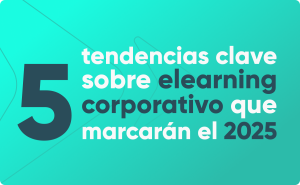5 corporate training trends that will shape 2025

Corporate training has evolved rapidly in recent years. The pandemic of 2020 marked a turning point accelerating the adoption of digital learning in organizations. What began as an urgent response to global challenges has transformed into a new reality for corporate learning.
As we move towards 2025, companies are evolving towards a more digital, flexible and personalized training model, where artificial intelligence, gamification and content personalization deliver increasingly immersive and effective learning experiences. In this blog, we explore the key trends that are shaping the future of corporate elearning.
1. Artificial Intelligence: customized and scalable training
Generative Artificial Intelligence is consolidating as a key tool for digital learning. Companies need their training to grow at the pace of the business, without relying on static content or manual processes. If it has already been booming in recent years, in 2025 its use in corporate training will grow exponentially, allowing companies to:
- Automate the creation of training content.
- Tailor courses according to the needs of each employee.
- Provide immediate feedback and improve knowledge retention.
Companies are not only looking to reduce costs, but to gain speed, scalability and customization. Our latest report “Future Trends and Technologies in Corporate Online Training” shows that 41% of organizations will prioritize internal talent over external contracts, driving the use of AI to train their teams.

2. Social and collaborative learning: sharing to learn faster.
Social learning is based on the idea that knowledge is not only acquired through structured courses, but also through interaction with peers, experts and communities within the company. It continues to evolve as one of the most effective trends in corporate training. E-learning platforms are evolving to better integrate:
- Forums and virtual communities where employees share knowledge.
- Social Learning platforms, such as the one included in Totara Suite, that encourage content curation.
- Digital mentoring systems, where experts guide other employees.
Collaborative learning improves retention and engagement by allowing knowledge to be applied in real-world scenarios. Leading companies are already implementing these methodologies to accelerate the training of their teams.

3. Microlearning: training in small doses
One of the main problems in corporate training is that it is too time consuming and does not fit into the employees’ working day.
Microlearning solves this with short contents (between 2 and 5 minutes) adapted to the worker’s working day, designed for:
- Reinforce key concepts with progressive learning, adapting to the forgetting curve.
- Integrate into the workflow, without interrupting productivity.
- Take advantage of mobile formats, facilitating access at any time.
- Improves user experience by being dynamic and interactive.
Earlier in our 2023 trends report, we noted that small capsule learning was going to be one of the key strategies for improving training in corporate environments. This approach highlights that it facilitates knowledge retention and allows employees to integrate learning into their daily routine.
Pill learning promotes more agile, personalized and efficient training by integrating it into the daily workflow.
4. Gamification: motivation and engagement in training
Gamification is the use of game elements and dynamics in non-game contexts, with the aim of boosting the motivation and engagement of participants. This technique is applied in many areas, including learning, and currently, 80% of employees believe that learning is more effective when gamification is used. In 2025, this trend will continue to grow with strategies such as:
- Serious games: interactive games designed to improve training.
- Reward systems: points, badges and levels to increase motivation.
- Interactive assessments: quizzes and challenges that reinforce training.
Advanced LMSs allow you to implement game mechanics to make training more engaging, challenging and effective.

5. Collaboration with expert employees (SMEs): training from within
Companies are betting on internal knowledge as a competitive advantage. Instead of relying exclusively on external training, 2025 will see a greater role for Subject Matter Experts (SME) in corporate training.
How is this trend implemented?
- Creation of internal training content with the help of SMEs.
- Implementation of peer-to-peer mentoring and learning systems.
- Development of internal upskilling and reskilling programs.
Fostering internal talent not only reduces costs, but also improves the learning culture within the organization.
Conclusion
For training to have a real impact, must be agile, motivating and aligned with strategic needs.
Corporate training in 2025 will continue to evolve towards a more personalized, agile and collaborative model. The combination of Artificial Intelligence, social learning, microlearning, gamification and the involvement of internal experts will allow companies to improve team training more efficiently and aligned with their needs.
Is your company ready to take the next step in elearning?
At Actua, we help you design innovative and effective training strategies. Let’s talk and find the best solution for your team.
sources:
- https://actuasolutions.com/recursos/tendencias-y-tecnologias-de-futuro-en-la-formacion-online-corporativa/
- https://brandonhall.com/making-the-most-of-microlearning/
- https://blogs.uoc.edu/informatica/es/gamificacion-10-anos-despues/
- https://www.equiposytalento.com/noticias/2025/01/17/del-microlearning-a-la-gamificacion-8-tendencias-que-transformaran-la-formacion-empresarial-en-2025/


